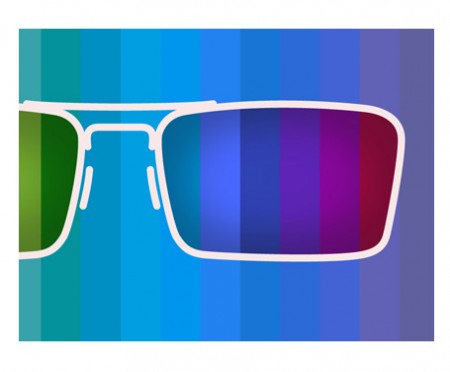June 28, 2016 – The term colour blindness is a misnomer. People who suffer from it are not really blind to colour they just have a reduced ability to see the range of colours in the spectrum. Most who suffer from colour blindness inherit it genetically. The genes responsible are carried on the X chromosome.
Enchroma, a Berkeley, California company has created glasses designed with spectral-filtering technology that lets red-green colour blind people see what their missing. The glasses are the product of more than ten years of research in the field. They are effective with about 80% of colour-blind people. Colour blindness tends to be much more common in men than women. The total number of people with some degree of colour-blindness globally is 300 million with the ratios of 1 in 12 men and 1 in 233 women experiencing the condition.
One of those women provided a testimonial on the EnChroma wite when she got her first pair of colour-blind corrective glasses. Sheila Carter of Georgetown, Texas described this first experience very aptly:
“Now I can see that a stop sign is red instead of looking for the white edge around the octagon, and that it is not the same color as surrounding trees. I was amazed to see that each leaf on a tree is a slightly different color of green. For sunsets, I wasn’t aware that wide bands of glowing color shoot out. The more I wear EnChroma, the more I become aware of colors I’ve never seen before. What an amazing thing.”
So what is it that these glasses do to make the formerly colour blind suddenly see colour?
They use a filter targeting specific photo pigments. The patented methodology is called “multinotch” filtering. It cuts out some wavelengths of light to enhance those that address colour. The lenses separate the overlapping of red and green cones in the human eye and improve colour perception.
EnChroma is not a cure for colour blindness just as glasses don’t cure myopia (short sightedness) or hyperopia (farsightedness), and today nobody thinks twice about those technologies which have been around for several centuries. To them we now add a way for people to correct colour perception deficiency. How wonderful is that? Prices start at $299 U.S. for adults and $269 for children.










[…] Can You Cure Colour Blindness? No, But You Can Do the Next Best Thing […]
[…] Can You Cure Colour Blindness? No, But You Can Do the Next Best Thing […]